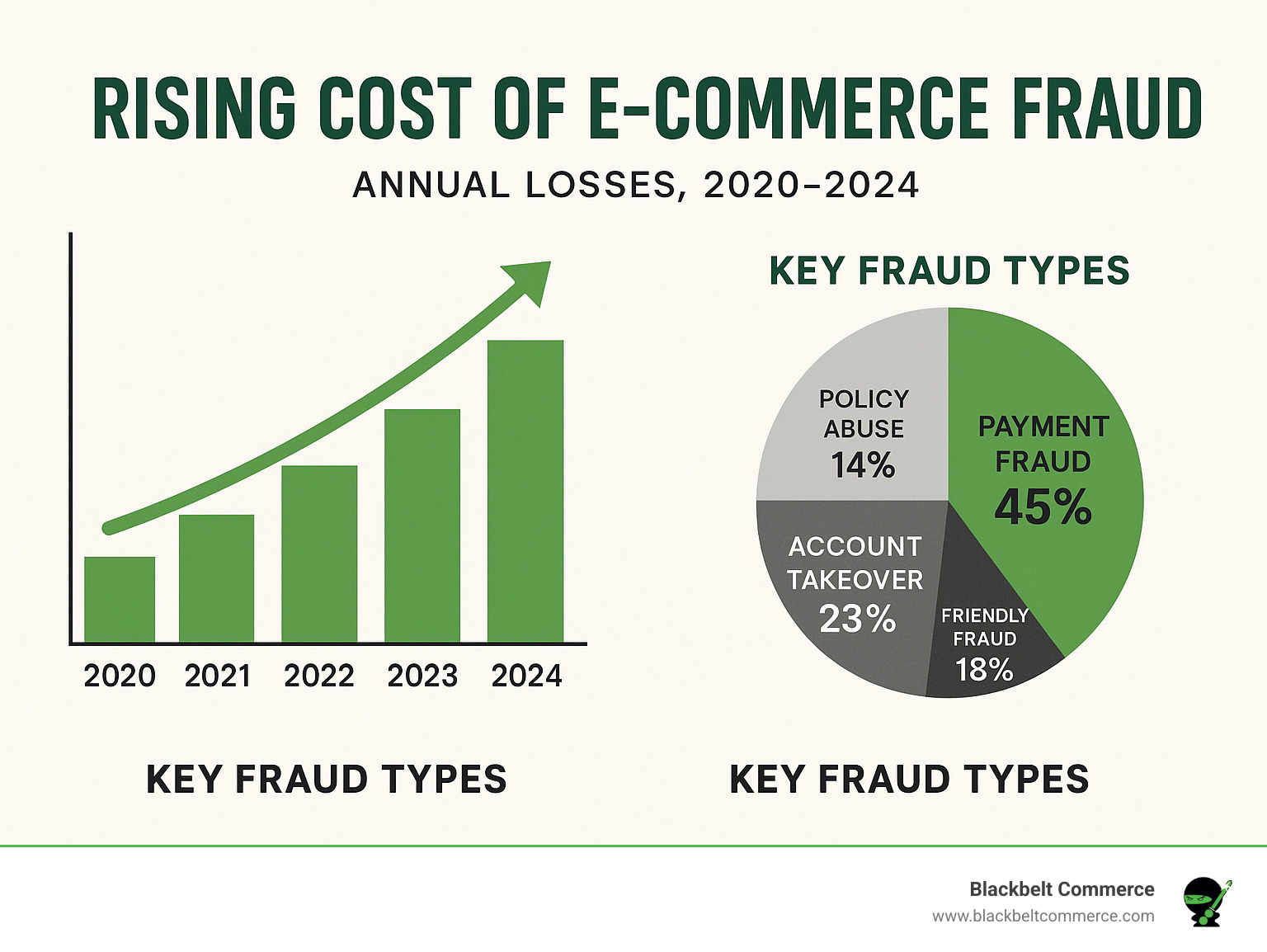The Digital Guardian Every E-commerce Business Needs
An e commerce fraud prevention specialist is a cybersecurity professional who protects online businesses from fraudulent transactions, account takeovers, and financial losses through real-time monitoring, risk analysis, and fraud detection strategies.
Key responsibilities of an e commerce fraud prevention specialist include:
- Real-time transaction monitoring – Analyzing payments as they happen to catch suspicious activity
- Risk assessment – Evaluating customer behavior patterns and transaction data
- Fraud investigation – Manually reviewing flagged orders and suspicious accounts
- Policy development – Creating rules and procedures to prevent future attacks
- Data analysis – Using tools like SQL and machine learning to identify fraud trends
- Cross-team collaboration – Working with customer service, legal, and operations teams
The need for these specialists is critical, with account takeover attacks up 354% year-over-year and the e-commerce industry losing an estimated $38 billion annually to fraud. Since every $1 of fraud costs retailers $3.75 to resolve, prevention is far more valuable than cleanup.
Modern specialists use advanced tools like Kount and Riskified, combining behavioral analytics with machine learning to stop fraudsters without blocking legitimate customers. They are the invisible guardians of online shopping.
I’m Cesar A Beltran, CEO of Blackbelt Commerce. With over 15 years of experience and having worked with 1000+ online stores, I’ve seen how a skilled e commerce fraud prevention specialist transforms a business from fighting chargebacks to confidently scaling.

E commerce fraud prevention specialist further reading:
The Anatomy of the Role: Responsibilities, Skills, and Tools

An e commerce fraud prevention specialist is part detective, part data scientist, and part customer service representative. At Blackbelt Commerce, we’ve seen how these digital guardians protect a business’s bottom line while ensuring customers can shop with confidence.
Daily Responsibilities and Core Tasks
A specialist’s day begins with real-time transaction monitoring, scanning incoming orders for threats. Using platforms like Kount, they analyze data points like email addresses, IP addresses, and device IDs, treating each transaction like a unique digital fingerprint.
Much of their work happens in manual review queues, where they investigate suspicious activity flagged by automated systems. They examine user behavior, login histories, and purchase patterns, such as a sudden shipping address change or an unusual late-night purchase from a different country.
Data analysis is the backbone of their work, helping them identify fraud patterns that aren’t obvious from single transactions. This detective work informs Ecommerce Risk Management strategies that protect the entire business.
Collaboration with customer service is key to balancing security with empathy. A flagged transaction might be a legitimate customer traveling, not a fraudster, and specialists must avoid making genuine customers feel like criminals. The day often ends with reporting on fraud metrics and policy refinement, a continuous cycle of improvement to stay ahead of threats.
Essential Skills for an Aspiring e-commerce fraud prevention specialist
This role requires a mix of hard and soft skills, combining an analytical mindset with an investigator’s intuition to see patterns others miss. Problem-solving is critical, as fraudsters constantly evolve their tactics. Attention to detail is paramount, as spotting one suspicious digit can save thousands.
Strong communication skills are essential for explaining complex fraud cases to non-specialist colleagues and training team members. Adaptability is also crucial in this fast-moving field, as new payment methods and fraud tactics emerge constantly.
On the technical side, SQL proficiency is non-negotiable for querying databases. Knowledge of Python or R improves analysis capabilities, allowing for predictive modeling. Experience with specialized Fraud Detection Tools like Kount or Riskified is incredibly valuable, as these platforms use machine learning to detect fraud far more effectively than traditional methods.
Certifications and Training to Get Ahead
Certifications build trust and open doors. The Certified Fraud Examiner (CFE) is a highly respected credential providing a solid foundation in investigative techniques. For e-commerce specifically, the Certified eCommerce Fraud Specialist offered by Riskpro Learning is perfectly custom to online retail challenges.
The Fraud Professional Certification from The Fraud Practice offers another excellent pathway with techniques designed for fraud prevention professionals. McAfee Institute certifications also carry weight in the cybersecurity community.
Continuous learning is essential for survival in fraud prevention. Fraudsters constantly evolve, so specialists must stay sharp through webinars, conferences, and self-study to keep up with emerging threats. This investment in education pays dividends, opening doors to senior roles and demonstrating expertise.
The Battlefield: Common Types of E-commerce Fraud
An e commerce fraud prevention specialist faces a constantly evolving battlefield of threats. Understanding these threats is the foundation of an effective defense.
Payment and Transactional Fraud
These attacks target the transaction itself, hitting your revenue stream directly.
- Credit card testing involves fraudsters making small, often automated, test purchases with stolen card numbers to verify if they are active. Once confirmed, the cards are used for larger fraud or sold. These small transactions can easily go unnoticed.
- Identity theft is when criminals use a stolen identity—name, address, personal details—to make purchases or open accounts.
- Phishing schemes trick people into revealing sensitive information through fake emails or websites, which is then used for unauthorized purchases.
- Triangulation fraud is a complex scheme where a fraudster sets up a fake store. They take orders, then use stolen credit cards to buy the products from a legitimate retailer and ship them to the customer. The legitimate retailer and the cardholder bear the loss.
- Unauthorized transactions is an umbrella term for any purchase made without the cardholder’s permission, requiring robust Payment Gateway Security to prevent.
Account-Related Fraud
These attacks target customer accounts, which can damage long-term customer trust and loyalty.
- Account Takeover (ATO) is a top priority, with attacks up 354% year-over-year. Criminals use stolen credentials from data breaches or phishing to access customer accounts. Once inside, they can make purchases, steal payment info, redeem loyalty points, and lock out the real owner, all while appearing legitimate.
- New account fraud involves creating fake accounts with stolen or synthetic identities. These accounts are used to exploit promotions, make fraudulent purchases, or build credibility for larger scams.
- Loyalty program abuse targets reward points and membership benefits. Fraudsters may hack accounts to steal points or create fake accounts to exploit welcome bonuses.
Combating these threats is why Protecting Your Ecommerce Business from Fraud requires both technology and human expertise.
Policy and “Friendly” Fraud
This frustrating category often involves your own customers.
- Friendly fraud happens when a legitimate customer buys and receives a product, then disputes the charge with their bank, claiming it was unauthorized or the item was faulty. The merchant loses the sale, the product, and pays chargeback fees.
- Chargeback abuse is when customers systematically exploit the chargeback process across multiple merchants. The financial impact is severe: every $1 of fraud costs retailers $3.75 to resolve, much of it from chargeback expenses.
- Refund fraud and return abuse involve customers getting refunds without returning items, returning counterfeit goods, or serially returning used products.
These behaviors exist in a gray area, but their impact on your bottom line is real. Effective Chargeback Prevention is essential but requires a delicate balance to avoid creating friction for legitimate customers.
Why Every Online Store Needs an E-commerce Fraud Prevention Specialist

Think of an e commerce fraud prevention specialist as your store’s digital bouncer, keeping bad actors out while welcoming your best customers. At Blackbelt Commerce, we’ve seen that operating without proper fraud protection is like leaving your digital doors wide open to a business-killing epidemic.
Protecting the Bottom Line
The e-commerce industry loses an estimated $38 billion annually to fraud—money that could otherwise be invested in growth. Worse, for every $1 of fraud, it costs retailers $3.75 to resolve, according to LexisNexis Risk Solutions. This multiplier effect includes chargeback fees, investigation costs, lost merchandise, and wasted time.
A skilled e commerce fraud prevention specialist attacks this problem by reducing chargebacks at the source. Tools like Kount prevent invalid chargebacks, while Riskified can shift liability away from merchants, with some clients seeing a 594% ROI.
Effective fraud prevention also increases approval rates. Poor systems often decline legitimate customers, but a specialist distinguishes real threats from good customers. Tools like Kount can increase approval rates by 15%, and Riskified by 4-8 percentage points, directly boosting revenue and maximizing profits.
Enhancing Customer Experience and Trust
Great fraud prevention improves the experience for legitimate customers. It’s about creating a secure and seamless environment.
Balancing security with convenience is key. Customers expect a checkout process that is both easy and secure. Too much friction leads to abandoned carts; too little invites fraud. Solutions from companies like Ping Identity create seamless experiences that can increase purchase likelihood by up to 30%.
Reducing false positives is critical. Declining a legitimate customer’s order not only loses that sale but can lose the customer forever. A specialist fine-tunes security systems to avoid these costly mistakes.
Protecting customer data builds the trust that modern e-commerce requires. When customers feel their information is safe from account takeovers, they shop with confidence, which helps in building brand reputation. A secure checkout process is your moment of truth; following Online Store Security Best Practices ensures this final step feels both safe and effortless.
An e commerce fraud prevention specialist is a profit multiplier who keeps your customers and your accountant happy.
Forging a Career Path: Growth, Trends, and Opportunities

The field of e-commerce fraud prevention is changing from a niche specialty into a high-demand career path. As online shopping explodes and fraudsters become more sophisticated, businesses desperately need skilled professionals to steer this complex landscape.
The Career Ladder for an e-commerce fraud prevention specialist
A career often begins with an entry-level Analyst role, focusing on real-time transaction monitoring and manual reviews. These roles, often requiring 2+ years of experience, are where you learn to spot the subtle signs of fraud.
With more expertise, you can move into a Senior Specialist/Strategist role. This involves designing fraud prevention strategies, not just reviewing transactions. A position like a Risk Strategist at Stripe requires 5+ years of experience and involves designing ML models and review workflows.
Further progression leads to Fraud Manager positions, where you oversee teams and set strategic direction. At the top are Director of Risk/Trust & Safety roles, which are executive positions that set company-wide security policies and manage large budgets.
The demand for these roles is strong in tech hubs like New York and Los Angeles. Companies such as Snaplii, HomeEquity Bank, and Mastercard are actively hiring across North America, creating a robust job market. You can Find fraud prevention jobs in Los Angeles and other major cities.
Future Trends and Key Challenges
The future of fraud prevention is evolving rapidly, and specialists must adapt to stay relevant.
- AI and Machine Learning: This is the most transformative trend. Platforms like Kount and Riskified use ML to analyze data and spot patterns with incredible speed. Future specialists will need to work alongside AI, training models and knowing when human judgment is needed.
- New Payment Methods: Adapting to Buy Now, Pay Later (BNPL), cryptocurrency, and real-time payments is a major challenge. These create new fraud vectors that require specialized detection techniques.
- Sophisticated Bot Attacks: The arms race against bots continues. Modern bots mimic human behavior with scary accuracy, making them difficult to detect. Stopping these automated attacks is crucial for protecting accounts and business operations.
- Global Regulations: Navigating data privacy laws like GDPR and CCPA, along with anti-money laundering (AML) and Know Your Customer (KYC) requirements, is increasingly complex. Specialists must ensure fraud prevention is both effective and legally compliant.
The specialist of tomorrow must be a detective, data scientist, compliance expert, and customer advocate. It’s a challenging but rewarding career, grounded in the principles of comprehensive Ecommerce Security.
Frequently Asked Questions about E-commerce Fraud Prevention
What is the average salary for an e-commerce fraud prevention specialist?
The salary for an e commerce fraud prevention specialist depends on experience, location, and company size.
- Entry-level positions typically start around $40,000-$60,000, but some companies like Turo offer higher base salaries ($58,000-$73,000) plus equity for entry-level roles.
- With 3-7 years of experience, salaries often range from $80,000 to $120,000 annually.
- Senior strategist roles at major tech companies like Stripe can earn between $134,900 and $202,300. This high investment is justified since every dollar of fraud costs retailers $3.75 to resolve.
Salaries trend higher in major markets like New York City and Los Angeles due to demand and cost of living.
Can a small e-commerce business afford a fraud specialist?
Small businesses should ask not if they can afford a specialist, but if they can afford not to have one. The cost of a few fraudulent orders can be devastating. However, there are several accessible options beyond hiring a full-time specialist:
- Outsourcing to specialized consultants or agencies provides expert protection without a full-time salary.
- Advanced Fraud Detection Tools like Kount and Riskified use machine learning to automate much of the work and integrate with platforms like Shopify.
- Hiring a part-time or contract specialist can help set up systems and provide ongoing oversight at a manageable cost.
Protecting your revenue is an essential business investment that pays for itself.
How does fraud prevention differ from general cybersecurity?
Fraud prevention and general cybersecurity are related but distinct fields.
General cybersecurity protects the entire digital infrastructure—networks, systems, and data—from threats like breaches and malware. It covers broad standards like PCI Compliance for Ecommerce to ensure payment processing is secure.
Fraud prevention, on the other hand, focuses specifically on transactional and user behavior risk. A specialist acts like a detective, analyzing behavior to determine if a user is legitimate or attempting theft. For example, while cybersecurity secures the payment gateway, the fraud specialist monitors the transactions flowing through it for suspicious patterns.
These two areas are interconnected and teams often work closely together. You need both the fortress walls (cybersecurity) and the guards watching for suspicious activity inside (fraud prevention).
Conclusion
In online commerce, the e commerce fraud prevention specialist is a vital guardian, acting like a digital locksmith who constantly studies criminal techniques to stay one step ahead.
These specialists blend sharp analytical thinking with cutting-edge technology to protect your revenue and customer trust. They monitor transactions, spot hidden patterns, and adapt to new threats, acting as a detective, data scientist, and security expert in one.
With $38 billion lost annually to e-commerce fraud and every stolen dollar costing $3.75 to resolve, a skilled specialist isn’t just smart—it’s essential for survival. They prevent losses, boost your bottom line by increasing approval rates, and create smoother customer experiences.
Beyond the financials, these specialists protect your reputation and customer relationships. A secure, smooth experience builds the trust that creates loyal brand advocates.
The career opportunities in this field are expanding as quickly as the threats. From entry-level analysts to senior strategists earning six-figure salaries, the demand for these digital guardians will only grow.
For businesses ready to build a fortress around their online operations, partnering with experienced professionals is key. At Blackbelt Commerce, we’ve helped over 1,000 businesses create not just stunning Shopify stores, but secure ones that can scale confidently without the constant worry of fraud.
Ready to transform your online store into a secure, conversion-optimized powerhouse? Let’s discuss how our expertise can protect and grow your business.

